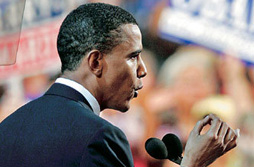 영어토론방 영어토론방 | Home>영어토론방 |
Diplomacy Obama's effect in the diplomacy
페이지 정보

본문
 Mr. Obama and the Neighborhood
Mr. Obama and the Neighborhood President Obama wisely began trying to improve the United States’ extremely sour relations with Latin America this week. He slightly eased the counterproductive embargo on Cuba, and in a visit to Mexico, he vowed to help confront the drug cartels. He also promised leaders at a regional summit a “new day” of practical cooperation in place of former President George W. Bush’s ideologically constricted policies.
Mr. Obama tackled the most neuralgic issue in hemispheric relations when he abandoned longstanding restrictions on the ability of Cuban-Americans to visit family members in Cuba and send them money. Cuba’s people have paid a high enough price for nearly three decades of repression and isolation imposed on them by Fidel Castro and his cronies.
Mr. Obama also allowed telecommunications companies to pursue licensing agreements in Cuba. Such deals are needed to pierce the wall of silence at the heart of the Cuban system by expanding access to cellphones and satellite television.
President Raúl Castro responded to Mr. Obama’s overtures with a call for talks about “everything.” We hope the administration follows up and that Mr. Obama and Secretary of State Hillary Rodham Clinton continue to insist that Havana reciprocate by freeing political prisoners and respecting human rights.
Mr. Obama made a welcome commitment to help President Felipe Calderón of Mexico combat drug trafficking, which has caused a surge of attacks on both sides of the border. He acknowledged that America’s demand for illegal drugs fueled the trade and that its inability to stop the flow of weapons south fed the violence.
Obama defends greeting Hugo Chavez
Rebuffing criticism of the warm greetings he exchanged with Venezuelan leader Hugo Chavez, President Obama said Sunday that the United States, with Its overwhelming military superiority and need to improve its global image, could afford to extend such diplomatic "courtesy."
In a news conference capping a three-day meeting of leaders from the Western Hemisphere, Obama also said the U.S. must engage other countries through humanitarian gestures, not only military intervention.
Obama said it would be a mistake to measure the Summit of the Americas by the specific agreements reached. By listening to his counterparts and eschewing heavy-handed diplomacy, he said, he was creating an atmosphere in which, "at the margins," foreign leaders are "more likely to want to cooperate than not cooperate."
At one meeting, Chavez made a show of walking around the table as the cameras rolled and handing Obama a copy of "Open Veins of Latin America," a 1971 book by Eduardo Galeano chronicling U.S. and European imperialism in the region.
Apparently impressed with Obama, Chavez seemed ready to reevaluate relations with the United States. He announced that he was considering appointing an ambassador to Washington, an idea he discussed over the weekend with Secretary of State Hillary Rodham Clinton. The two countries expelled each other's ambassadors last year.
"We have a different focus, obviously," Chavez said on Venezuelan state television. "But we are willing. We have the political will to work together."
Though Cuba's fate was not on the official agenda of the summit, which included only democratically elected leaders from the hemisphere, many Latin American leaders pressed Obama to lift the United States' 47-year-old trade embargo on the island nation and normalize relations. Obama resisted.
His administration has already announced that it is loosening travel restrictions on Cuban Americans visiting family on the island. But at this point, Obama has refused to go further, calling upon Castro to move toward a more open and democratic form of government.
Lawrence H. Summers, the president's top economic advisor, said Sunday that the embargo would not end any time soon.
"That's way down the road, and it is going to depend on what Cuba . . . does going forward," Summers, who accompanied Obama on the trip, said on NBC News
In his news conference, Obama said he welcomed Cuban leader Raul Castro's statement last week that his government wanted a full dialogue with the U.S. about a range of issues, including human rights, treatment of dissidents and media restrictions. Castro also acknowledged that the Cuban government may have been wrong in some of its positions.
By Peter Nicholas , April 20, 2009
Question
1. Because of president Obama’s communication skill,
he can make another aspect of relationships with other countries.
Then, what kinds of communication skills does he have?
And let’s talk about good and bad points in your communication skill.
2. The United States used to consider them as a judge of the global society.
However, from president Obama’s new position in policy of diplomacy many countries start to
change their relationship with the United States.
How do you think the relationship between the United States and other countries will change?
3. Nowadays, world is getting bigger and bigger in the name of globalization.
Then, what kinds of attitudes do you think Korea should have in relationship with other countries?
이 글은「대학연합영어토론동아리」www.pioneerclub.com에서 제공하는 영어토론 정보입니다.
댓글목록
등록된 댓글이 없습니다.

